
It seems to believe the public is so fed up with nurses, doctors and teachers striking, politicians must interfere and tell everybody what to do.
Last week, Health Minister Simeon Brown called on Health New Zealand Te Whatu Ora and the Association of Salaried Medical Specialists to urgently enter into binding arbitration to settle its collective agreement negotiations.
Maybe Mr Brown, spooked at the prospect of another health strike by senior doctors later this month after two days of action from hospital nurses last week, felt he had to look as if he was doing something.
Mr Brown went as far as asking the parties to agree to arbitration by 4pm Friday, an hour before voting closed for senior doctors over possible strike action.
(The outcome of the senior doctors’ vote on strike action should be known early this week and allied health workers are also voting on their latest offer.)
Unsurprisingly, Mr Brown’s plea did not find favour with the union.
It did not agree bargaining had broken down.

The union called Mr Brown’s move misinformed, disingenuous, and questioned his grasp of employment law.
In turn, Mr Brown drew attention to the use of arbitration in 2023 for secondary school teachers, but in that instance the parties did not agree to a binding arbitration.
An arbitration panel and process was agreed, and once the panel made its decision, time was allowed for the government to respond to its recommendations and for union members to vote on a potential settlement. This does not seem to be what Mr Brown was suggesting.
The teachers’ move depended on the government being prepared to stump up more money if that was what was decided was needed.
In the current health disputes, unions have repeatedly been told there is no extra money.
As employment law academic Victoria University’s Emeritus Professor Gordon Anderson said, the minister’s highly unusual request seemed to be about managing the public’s perception of the dispute.
There was no statutory responsibility for the union to engage in such a process and it was not surprising it rejected the idea.
We wonder where the government is getting its advice from.
We have seen various ministers exaggerating the pay and conditions of teachers and health workers, promoting the idea they are already overpaid and, in some instances, do not deserve pay rises in line with the cost of living. Concerns about short-staffing and any suggestions of hiring freezes are denied.
Telling workers you value them but not responding adequately to their concerns is a curious strategy if you want them to enthusiastically embrace any policies which they will have to implement.
As disillusioned workers and the unemployed continue to pile on to planes for Australia, it makes no sense.
And another thing
There was much anticipation ahead of the first speech of the Māori queen Te Arikinui Kuini Nga wai hono i te po at Tūrangawaewae on the anniversary of her coronation.
The majestic Te Arikinui Kuini Nga wai hono i te po did not disappoint, giving a moving, warm, affirming and strong speech to the thousands gathered to hear her, followed by her joining, with poi, in the waiata and then a rousing haka.
The excitement and enthusiasm for the beginning of this young wahine’s reign and her message of hope was evident in the coverage of this event.
Reinforcing her father’s kotahitanga (unity) message, she said being Māori was not defined by having an enemy or a challenge to overcome.
It was speaking the language, taking care of the environment, reading and learning about the history.
There were many ways to manifest being Māori, not just in times of protest.
Kuini also announced two economic initiatives, an economic summit for te Iwi Māori to be hosted by the Kiingitanga later this year, and Tahua Kotahitanga, a fund to help Māori unlock investment opportunities independent of government.











